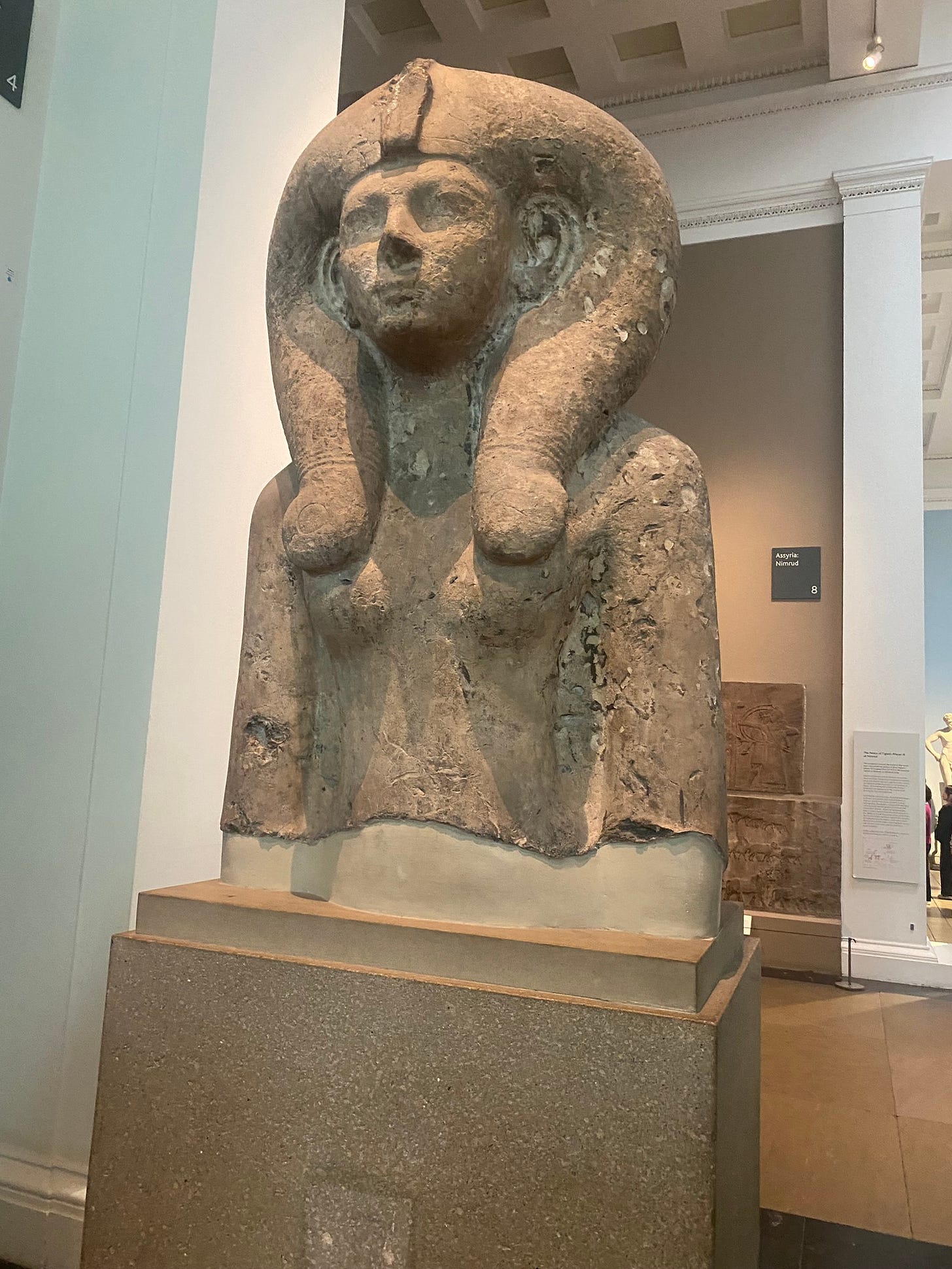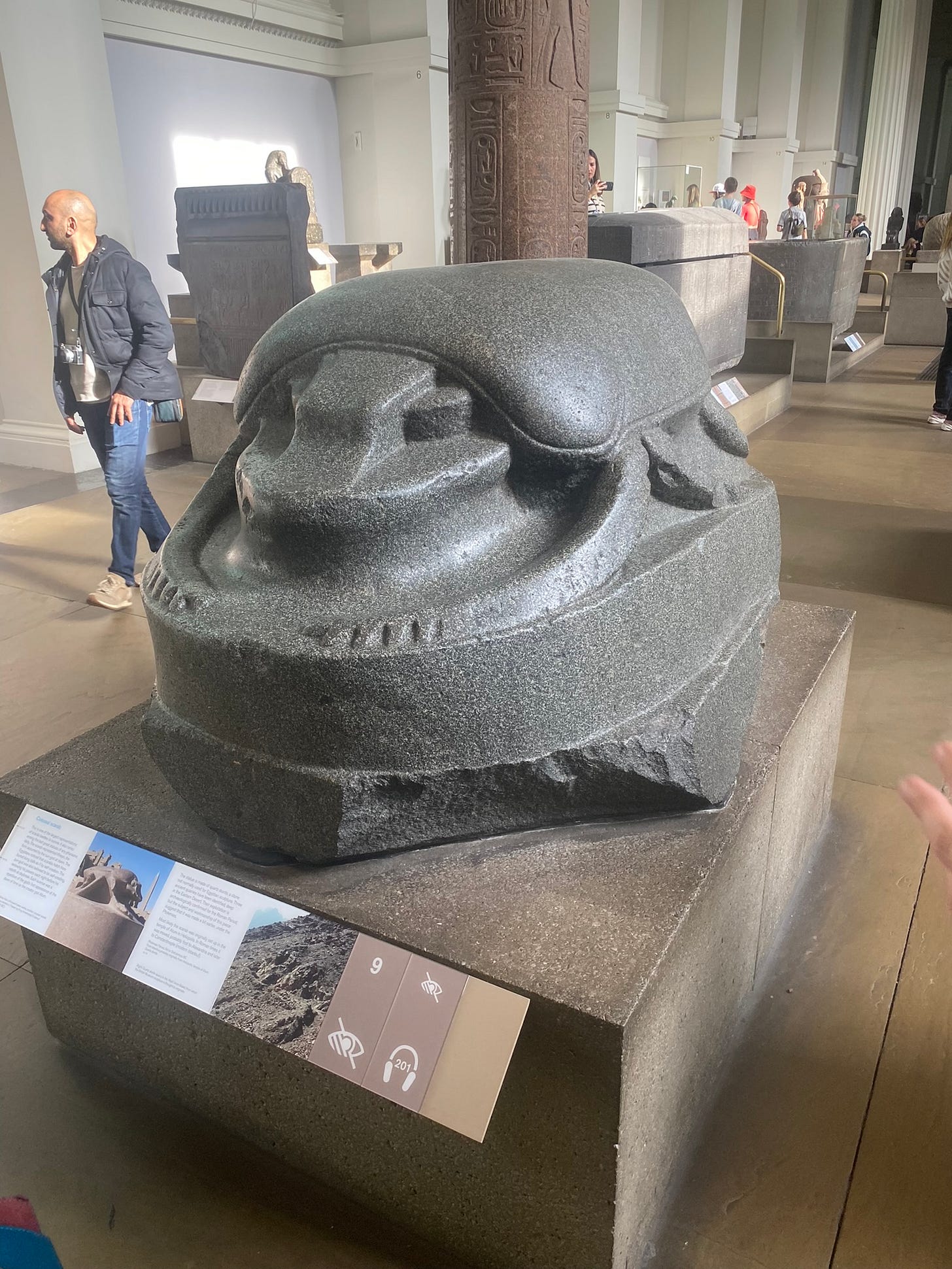Whilst writing this weeks missive I was listening to the ‘Leading’ Podcast where the sculptor Anthony Gormley was being interviewed by Rory Stewart and Alistair Campbell. I knew nothing of Gormley and was overwhelmed by his responses and insight. He is also another devoted meditator. Toward the beginning Anthony Gormley mentions how visiting the Egyptian antiquities as a boy his artistic imagination was fuelled, how could it not? I include a picture I took at the British Museum last month, can you identify the goddess? The link to the podcast is below if you would like to listen:
This led to this reflection on harmony.
Ancient civilisations knew the value of music and based their culture around it; the Ancients certainly knew the value of harmony and the danger of discord. We all know innately that music opens the heart.
One of the things the great Renaissance philosopher Ficino says is:
'The harmony we make with musical instruments and voices is the image of divine Harmony.'
In Greek mythology Harmonia is the daughter of Mars and Venus, the god of war and the goddess of love. Harmony stands therefore as a mean between the two, both the cause and the result of a loving agreement. According to this way of thinking, harmony tempers extremes. Is harmony then merely some universal middle ground, neither one thing nor the other?
In mathematics the mean is the binding of two extremes by a single term. Plato claims that it is by a study of the mean, that one can approach an understanding of the laws that govern creation. The mean not only allows for the expansion of number and form but also allows an inner recognition of and return to the underlying unity from which all number arises.
Some have said that love is the ultimate mean. Within the field of love all forms rise and are known, both the physical forms detected by the senses, but also the subtle forms of thought and emotion. In future posts I shall be offering you some practical ways to get in touch with their unity and ways to harmoniously connect to your being.
It is through the recognition of the unity that lies behind and gives rise to the great diversity of things that conflicting forms may be drawn into something which is entirely concordant and harmonious. By its very nature it is to be found beneath the surface aspect of all forms, waiting to be tapped. This is what Frank Lloyd Wright, the great American architect, has to say as to how important it is to the creative artist:
'This is what it means to be an artist - to seize this essence brooding everywhere, just behind aspect.'
What traditional wisdom constantly tells us is that the more profound the recognition of this essence, the more we appreciate Harmony. The more we appreciate Harmony, the more we are able to express Harmony in our thoughts and deeds.
Ficino, speaking from his classical background, says this of this realm, calling it Jove, like the other philosophers of the Platonic tradition:
Poetry arises from the Muses and the Muses from Jove. The followers of Plato repeatedly call the soul of the whole universe Jove, who inwardly nourishes heaven and earth, the moving seas, the moon’s shining orb, the stars and sun. Permeating every limb, he moves the whole mass and mingles with its vast substance.
Shakespeare calls Jove the Tenth Muse. He was after all their father, with Mnemosyne, memory, being their mother. For his inspiration he dismisses the other nine, going instead straight to source:
How can my muse want subject to invent
While thou dost breathe, that por’st into my verse
Thine own sweet argument, too excellent
For every vulgar paper to rehearse?
O, give thanks, if aught in me
Worthy perusal stand against thy sight;
For who’s so dumb that cannot write to thee,
When thou thyself dost give invention light?
Be thou the tenth Muse, ten times more in worth
Than those old nine which rhymers invocate,
And he that calls on thee, let him bring forth
Eternal numbers to outlive long date.
If my slight muse do please these curious days,
The pain be mine, but thine shall be the praise.
Scarab Sculpture at the British Museum
Do enjoy the audio and thank you for supporting my writing.
David




We are well reminded. Splendid stuff!👍 Remember Mnemosyne! Generative of epic.
Of harmony I am reminded of Pound's Pisan Cantos when he was imprisoned under threat of likely execution for treachery saw the r swallows along the taut strands of barbed wire as musical notes.
Thanks and thanks for taking the time. Am just about ok enough this year enough to get into the garden for an urgent job before the next load of rain. Will follow up later.